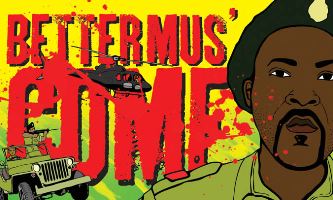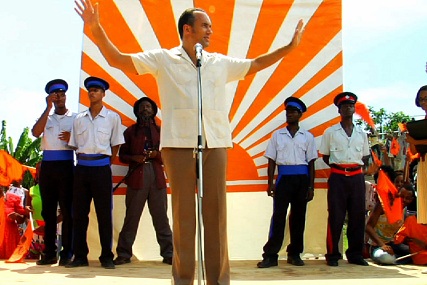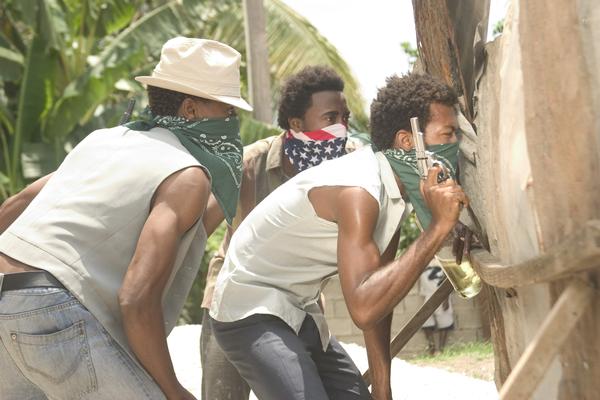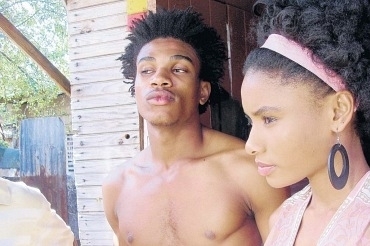
The late 1970s saw an emergence of reggae music onto the global scene. Artists such as Bob Marley, Peter Tosh, and Jimmy Cliff were at the forefront of the movement. However, the music that many grooved to all over the world was actually steeped in a grim reality - one depicted in the new independent film called Better Mus' Come.
The issues of political corruption, class warfare, and impoverished communities rang loud in the lyrics of the aforementioned artists. Were they actually speaking of Jamaica - the most feel-good island in the Caribbean? Not really.
Not unlike the recent issues of violence surrounding garrison ganglord Dudus Coke in Jamaica, the state of the Caribbean nation in 1978 serves as the backdrop for the feature-length film Better Mus' Come directed by Storm Saulter. The film follows Ricky (Sheldon Shepherd), a gang leader navigating his way through political party wars, fatherhood and an unlikely love affair.
The reigning political party at the time was the
People's National Party (PNP) led by Prime Minister Michael Manley played by American actor Roger Guenveur Smith. The film opens up with a PNP rally in one of
the slums of Kingston, the nation's capital. The people line the streets with
orange flags that pledge allegiance to the reigning party.
 Manley delivers a rousing speech, promising equality
and change. He denounces the class divide that says citizens uptown should have
better living conditions than those living in the downtown garrison. Historically,
many deemed this to be a semi-Communist agenda. A Rastaman flanked the Prime
Minister, holding a wooden staff. This was a subtle yet clever touch by Saulter
as it is a well-documented fact that, during the Michael Manley campaign, this
staff was a metaphor for the 'rod of correction' that would put Jamaica back in
line.
Manley delivers a rousing speech, promising equality
and change. He denounces the class divide that says citizens uptown should have
better living conditions than those living in the downtown garrison. Historically,
many deemed this to be a semi-Communist agenda. A Rastaman flanked the Prime
Minister, holding a wooden staff. This was a subtle yet clever touch by Saulter
as it is a well-documented fact that, during the Michael Manley campaign, this
staff was a metaphor for the 'rod of correction' that would put Jamaica back in
line.
The rally does not remain peaceful for long,
however, as Ricky and his gang break up the festivities with handguns and a
bottle bomb, torching the makeshift stage. The crowds disperse and the Prime
Minister escapes unscathed.
Ricky, a young yet shrewd slumdog, is intimidated by
no one. Not even the political faction aiding Ricky and his gang -- the other
party vying for power, the Jamaica Labour Party (JLP). While hired to disrupt
the PNP operations and murder those who might get in the party's way, Ricky is yet
a member of the underclass. Ricky and his gang steal ballot boxes by day (for
JLP) and cement from local construction sites at night (for daily survival).
Yet, when he is unable to retrieve running water to bathe his son and is disqualified
from a job as a mason because of his party/gang affiliation, Ricky soon
realizes the empty promises of the JLP.
The film accurately depicts the manipulation of the people by both the PNP and JLP, causing a divide in communities. The JLP supporters were commonly called 'Labourites,' while those supporting PNP were called 'Socialists.'
 The pitting of different party supporters made it
dangerous to venture into certain areas, if you had the wrong affiliation. The
separation of classes is magnified with the introduction of Ricky's love
interest Kimala (Nicole "Sky" Grey), a beautiful woman from the island's
countryside. The disparities between
their living conditions are clearly seen.
The pitting of different party supporters made it
dangerous to venture into certain areas, if you had the wrong affiliation. The
separation of classes is magnified with the introduction of Ricky's love
interest Kimala (Nicole "Sky" Grey), a beautiful woman from the island's
countryside. The disparities between
their living conditions are clearly seen.
Director Storm Saulter must be commended for
capturing the time period in Jamaica perfectly.
A genuine sense of authenticity is gleaned from viewing the film. Great
detail was employed to infuse popular words and catch phrases of the time. The dialect commonly known as patois, a
broken form of English, is used complete with subtitles for further clarity. The
costume design and vintage automobiles (ambulances, taxis, police, and military
vehicles) effectively portrayed the fashion and automotive trends of the
seventies.
The cinematography, featuring various aerial shots, shared breathtaking views of the country's landscape. The vivid and aggressive camera angles kept the audience engrossed in the film and engaged. The score to Better Mus Come, typified by the dub and rockers reggae that was popular on the island at the time, meshed beautifully with the film's action sequences.
A special treat to those who are familiar with concept
of traditional Jamaican "bashment," Saulter
includes a typical open air party scene where one of Ricky's gang members "deejays"
over a popular song's beat. The scene also alludes to the corruption within the
police force where locals are bullied and harassed because of their party
associations. We learn Ricky has spent time in jail before, further compounding
the troubles in his life.
 The immense violence is a constant in the movie and
is overwhelming at times, yet represents the reality of the period in the
impoverished communities.
The immense violence is a constant in the movie and
is overwhelming at times, yet represents the reality of the period in the
impoverished communities.
A very gripping scene, which is historically known
as The Green Bay Massacre in Jamaica, will hold viewers captive at the end as audiences
would have begun to sympathize with the murderous, cutthroat gangsters of the
slums. These men, although common criminals, have a deep humanity that surfaces
again and again in colorful forms throughout the film.
Better Mus Come is a poignant film with an excellent storyline. A definite understanding of the affairs of Jamaica, not only in the '70s, but also in present day, is garnered from seeing this film. The responsibility, hence, lies on the present generation to learn from history and resolve to make a change before another massacre occurs.

